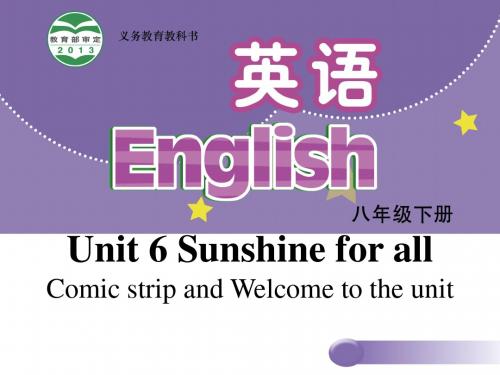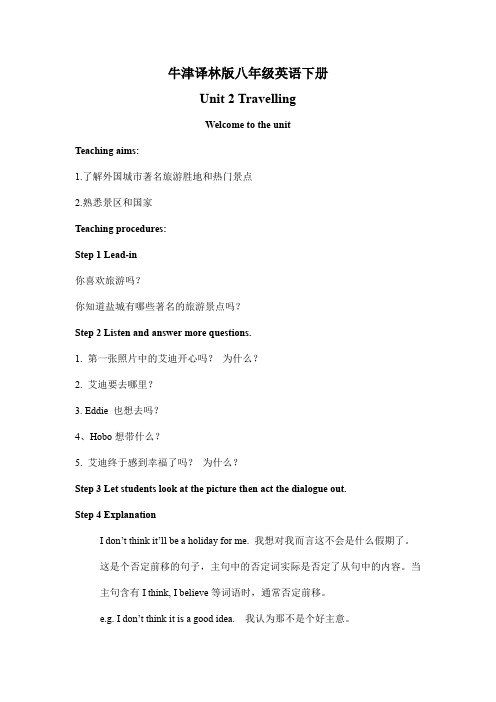《教学分析》-八下Unit2Welcome
牛津译林英语 八年级下册Unit2Welcome(共22张PPT)

help them cross the road treat(治疗) their eyes problems
donate money teach them to get rich
People who need help
never laugh at them
help them go upstairs
Have you ever been a volunteer? Have you ever helped people who need help?
meaningful
adj. 有意义的
support
vt. 支持
Test you Level 1
Do you have free time? Are you ready to help others?
disabled blind homeless
poor elderly deaf
Listen and answer
How can we help homeless people?
We can give them food and clothes.
We can write to the local government. They can provide special places for them to stay.
He ne3e.dHs EowdddieoetsoHgiovbeosowmanetfoEodddtieo thoimhetlop?eat at work.
Level 2 Read and act
Pair work
Level 3 Discuss
Group work
What do you think of Eddie?
牛津译林版八年级英语下册Unit 2 Welcome to the unit 示范公开课教案

三、教学目标
通过本课时的学习,学生能够:
1.准确说出一些国内外著名名胜古迹的英文名称,了解其相关背景知识;
评价
通过观察学生的作答情况,了解学生从音频中获取信息的情况。
通过观察学生的活动反馈,了解学生对语言的内化情况。
环节设计意图:培养学生提取关键信息的能力,同时通过口头输出,锻炼学生的口语表达能力,内化所学知识。
环节四:在新的语境中获取关键信息,模仿表演(15 mins)
应用实践之内化与运用
效果评价
通过观察学生活动的反馈,了解学生对不同名胜古迹的名称及其基本信息的掌握情况。
环节设计意图:通过创设环球旅行的具体语境,帮助学生学习不同名胜古迹的名称及其基本特征相关的知识,并通过猜谜活动,巩固内化所学。
环节三:听录音获取信息,谈论名胜古迹(10mins)
教师引导学生听录音获取信息,学习关于谈论名胜古迹的目标语言,并通过对话形式谈论名胜古迹。
9. Studentsread the comic strip and think about the question.
10. Studentsread and fill in the blanks.
11.Students act out theconversation.
活动层次
学习理解之感知与注意、获取与梳理
教学活动
1.Studentswatch the video and answer the question.
2.Studentshave a free talk.
牛津译林版英语八年级下册Unit2Travellingwelcome优秀教学案例

五、案例亮点
1.情景创设:通过展示真实旅行情境的图片和视频,激发学生的学习兴趣和想象力,使学生能够更好地理解和运用所学词汇和句型。
2.问题导向:通过提出旅行相关的问题,引导学生思考和表达,激发学生的探究欲望,提高学生的思维能力和语言表达能力。
2.设计小组讨论活动,让学生就旅行话题展开讨论,如"Where would you like to travel?",鼓励学生表达自己的观点和想法,提高学生的交流和表达能力。
3.通过小组合作,教师可以引导学生学会分享、合作,培养良好的团队精神和交流沟通能力,同时增加学生之间的互动和交流。
(四)反思与评价
四、教学内容与过程
(一)导入新课
1.教师可以通过展示一张自己旅行的照片,引起学生对旅行话题的兴趣,并提出问题:"Do you like traveling? Why?",激发学生的思考和交流欲望。
2.利用多媒体技术,播放一段旅行视频,让学生感受旅行的乐趣和魅力,并提出问题:"What did they do in the video? Can you guess their feelings?",引导学生运用已有知识进行预测和表达。
牛津译林版英语八年级下册Unit2Travellingwelcome优秀教学案例
一、案例背景
牛津译林版英语八年级下册Unit2 "Travelling"旨在通过学习旅行相关的词汇和表达,提高学生的语言运用能力和对实际生活中旅行话题的理解。本单元的核心句型是"What did you do? I stayed in a hotel./I visited the Great Wall./I took a boat trip.",同时涉及不同国家的旅游特色介绍。
unit2 Welcome to the unit课时教案牛津译林版八年级英语下册

牛津译林版八年级英语下册Unit 2 TravellingWelcome to the unitTeaching aims:1.了解外国城市著名旅游胜地和热门景点2.熟悉景区和国家Teaching procedures:Step 1 Lead-in你喜欢旅游吗?你知道盐城有哪些著名的旅游景点吗?Step 2 Listen and answer more questions.1. 第一张照片中的艾迪开心吗?为什么?2. 艾迪要去哪里?3. Eddie 也想去吗?4、Hobo想带什么?5. 艾迪终于感到幸福了吗?为什么?Step 3 Let students look at the picture then act the dialogue out.Step 4 ExplanationI don’t think it’ll be a holiday for me. 我想对我而言这不会是什么假期了。
这是个否定前移的句子,主句中的否定词实际是否定了从句中的内容。
当主句含有I think, I believe等词语时,通常否定前移。
e.g. I don’t think it is a good idea. 我认为那不是个好主意。
Step 5 Presentation展示一些关于中国一些名胜古迹的图片。
Step 6 Welcome the unit任务如果有机会(机会)出国旅游(出国旅游),你会去哪里?然后展示一些国外热门景点的图片:Step 7 Read and guess1. 它是世界上最长的墙。
2. 是法国人送的礼物。
它代表自由。
3. 听起来像披萨。
它在倾斜。
它可能有一天会倒下。
4. 女孩有鱼尾而不是腿。
5. 它是世界上最繁忙的表演艺术中心。
6. 它是伦敦泰晤士河上的一座大桥。
它有双塔。
Step 8 Work in pairsStep 9 Do some exercisesStep 10 Homework1. 准备一份事实档案并写下你的假期。
2023年牛津深圳版八年级英语下册Unit 2 Welcome (2)教案

Unit 2 Welcome (2)教案【教学目标】1.道德目标:了解并掌握电脑主要部件英文名称2.情智目标:①感情目标:学会调节和平衡学习和生活,热爱学习,热爱生活②认识目标:学会描述自己和同学的旅游见闻【教学时间】( 1 学时)【教学手段】PPT,recorder【教学过程】(一)感情调节:Have you ever travel abroad?Some pictures of places of interest(二)互阅作业(三)自学自学一1. 阅读“自学提示”(1)自学内容……本课生词(在家完成)(2)自学方法……生词的读音,意思及和以往学过相关知识点的链接。
2. 自学过程自学二1. 阅读“自学提示”(1)自学内容……Page 34(2)自学方法……a. 找出相关的重要短语b. 小组根据对话进行问答。
如:1.A: What is the ‘television’ ?B: It’s a TV.A: What is the ‘remote control’?B: It’s a mouse .2. 自学过程(知者加速者出示信息沟通牌、按照自学方法进行)自学三1. 阅读“自学提示”(1)自学内容……Page 35(2)自学方法……a. 学生有能力完成A,并在组内讨论答案b. 小组讨论,根据你的表格填写在小组内进行汇报(以文章的形式)。
2. 自学过程(知者加速者出示信息沟通牌、按照自学方法进行)自学四1. 阅读“自学提示”(1)自学内容……page 35(2)自学方法……a. 听录音,回答下列问题1. What does Danie l use a computer for?2. Why ?3. how often does he use a computer for this?b.跟读磁带,划出对话中的重要短语和句子。
2. 自学过程(四)互帮(五)释疑1. 讲解内容:语言点和重要句子2. 讲解方法:学生找,学生举例,教师进行相关拓展和举出其他例子检测学生掌握程度。
8下Unit2 Welcome to the unit

课件
自主备课
学习要求或学法指导
学习过程
自学准备与知识导学
1.与某人一起做某事
2.让某人做某事
3.几天
4.想要做某事
5.随身带着某物
6.开始准备
7.去…度假
8.…的首都
The students need enough timeto preparefor it
自学交流与问题研讨:
Task1Presentation
二.将下列句子译成中文
1. Have you ever been there?
2. I have been toBeijingbefore gone toNanjing.
4.I don’t think it'
5678
*通过与小组伙伴交流测试题/或教师核对答案.给自己打分:分。
Do you like traveling? Where have been ?
What places of interest would you like to visit?
Show some pictures and talk about what it is and where it is
Task2 Practice
章节与主题
8下Unit2 Welcome to the unit
主备人
审核人
使用人
使用周次日期
03.03
本课时学习目标或学习任务
1、掌握本课时的四会词汇以及重点句型。
2、进一步激发学生对本单元话题“Travelling”的学习兴趣。
本课时重点难点或学习建议
1、掌握本课时的四会词汇以及重点句型。
2、进一步激发学生对本单元话题“Travelling”的学习兴趣。
2020-2021学年牛津译林版英语八年级下册Unit2Welcometotheunit教案
-举例:学生能够在小组内分享旅行故事,并提问和回答相关问题。
2.教学难点
a.时态运用:学生需理解并运用一般现在时和一般过去时描述旅行经历,这是本节课的难点。
-举例:学生可能会混淆两种时态,需要教师通过具体例子和练习进行解释和指导。
b.词汇搭配:正确使用词汇搭配描述旅行体验,如“go on a journey”而不是“do a journey”。
-举例:教师需提供常见搭配的例句,帮助学生记忆和运用。
c.文化差异:理解不同文化背景下的旅行习俗和探险活动。
-举例:教师通过展示不同国家的旅行习俗,帮助学生理解文化差异。
d.听力理解:在听力练习中,学生需捕捉关键信息,理解旅行经历的细节。
-举例:教师选择合适的听力材料,设计问题,帮助学生提高听力技巧。
3.重点难点解析:在讲授过程中,我会特别强调一般现在时和一般过去时的运用,以及旅行与探险相关词汇的使用。对于难点部分,我会通过举例和练习来帮助大家理解。
(三)实践活动(用时10分钟)
1.分组讨论:学生们将分成若干小组,每组讨论一个与旅行相关的实际问题,如旅行计划、目的地选择等。
2.实验操作:为了加深对时态的理解,我们将进行一个简单的对话练习。这个练习将演示如何使用一般现在时和一般过去时描述旅行经历。
此外,我还注意到,部分学生在总结回顾环节,对于今天学习的知识点仍然存在疑问。为了帮助这部分学生更好地掌握知识,我打算在课后提供一些额外的辅导和练习,确保他们能够跟上课程进度。
2020-2021学年牛津译林版英语八年级下册Unit 2 Welcome to the unit教案
一、教学内容
2020-2021学年牛津译林版英语八年级下册Unit 2 Welcome to the unit教案:
新牛津译林版八年级英语下册u2 welcome教案
u2 welcome教案★课前参与:认真预习20-21页,尝试完成21页上所有内容。
重、难点解析:I’ve been there before. 我之前去过那里。
have/has been 意为曾经去过某地,强调“曾经去过现已返回”,后可接once,twice等次数,表示“去过某地几次”;也可和just, never, ever等连用,但不能与段时间连用。
他们去过紫禁城3次了。
They ________ ________ _______ the Forbidden City three times.你曾经去过那儿吗?_______ you ever ________ there?补充:have/has gone用法have/has gone 意为“到某地去了”,强调人还没有回来李小姐不在这里,她去北京了。
Miss Li isn’t here. She ________ ________ ________ Beijing. ★课中参与:一. 词汇运用1. We are going to have a picnic.Could you ___________(加入) us?2. I hear my father will take me to Nanjing. I’m very ____________ (兴奋) now.3. My family will go to Qingdao for a _______________ (假日).4. I like ___________ (旅游). What about you?5. Yesterday he saw the Leaning _____________(塔) of Pisa in Italy.6. What’s ___________ (特别) about the picture?7. I’m so busy these days because I’m getting r_____________ for my exams.8. There are many p___________ of i___________ in Beijing.9. Do you know the c____________ of Denmark?10. Have you ever ____________ (be) to The Great Wall?二. 用所给动词的适当形式填空1.Great changes____________(take) place since I __________(leave) there.2. Mother ____________ (bring) us some nice food when she came back from work.3. Jim met his friend on his way home and stopped____________(chat) with her.4. A: _____________anybody _____________(call) the police? B: No, not yet.5. Mr. Green ______________(travel) to Beijing many times.6. My father _____________(go) to England. And he ____________(be) back next week.7. --Do you know the woman in a blue dress?--Sorry, I don’t know. I ________ never __________(meet) her.8. _____________ you ____________ (catch) any robbers recently?9. The changes in Sunshine Town ____________ (bring) us lots of fun over the years.10. The girl ___________ (learn) English for about two years.三. 句型转换1. I think the dictionary will be useful for you. (否定句)I ____________ ____________ the dictionary _______ _______ useful for you.2. My father has visited Beijing many times. (划线提问)____________ ________ times _________ your father ________ Beijing?3. She’s already done her homework. (否定句) She ________ _______ her homework __________.4. I’ve known him since he came here.(划线部分提问)________ _______ _______ you ______________ him?5. Amazing changes have taken place in my hometown. (划线提问)_________ _________ taken place in your hometown?6. They haven’t finished their homework yet because they have too much homework. (划线提问)_________ __________ they ____________ their homework?四. 单项选择( ) 1. Beijing, ________ capital of China, has ________ long history.A.a; aB.the ; 不填C.the; aD.不填; the( ) 2.I like this silk dress, and it________so soft and comfortable.A. is feelingB. has feltC. feelsD. is felt( ) 3.He’s never watched such an important match, ________?A. h asn’t heB. has heC. isn’t heD. is he( ) 4---. _________ You_________the film? --- Yes.---When_________you________it? --- Last Wednesday.A.Have seen, have seenB. Have seen, did seeC.did see, did seeD.did see, have seen ( ) 5.Kitty_______London before and she is talking about her trip at home now.A. Has beenB. has been toC. have gone toD. has gone( ) 6.Would you like to go to the park _________ your holiday?A. onB. forC. toD. at( ) 7. ---What can you see in Italy? --- I can see ____________.A. the Great WallB. the Little MermaidC. Mount FujiD. the Leaning Tower of Pisa ( ) 8. He used to ________ in a small village, but now he has been used to _________ in a big city.A. live; livingB. live; liveC. living; livingD. living; live( ) 9. My uncle got married ______ 2009 and he has had a happy family _____ 2009.A. in; inB. in; sinceC. since; inD. since; since( )10. I think the problem will get __________ serious if the government doesn’t take action.A. much moreB. muchC. manyD. most五.翻译句子1. 我觉得明天对我来说不是一个假期。
8BUnit2Welcome电子教案
C. too muchD. much too
( )3. Have you ______ your lunch?
Yes, I ______ it at 11:50 a.m.
A. had; ateB. had; eat
C. have; ateD. have; eat
3. Talk about a place of interest in pairs.
展
示
评
价
1.教师必须关注的学科知识要点:
1). To match the pictures of the correct names of the places of interest from different country.
3. To understand the
questions before listening;
To read the useful
expressions and encourage
students to raise questions
about any grammarusage. Remind them to relate
should check them.
2. To make sure that
students use what they have learned in this class when
they do the exercises.
课后反思
本课主要学习不同国家的著名景点,简要了解它们的特色。此外,初步接触been to和gone to,注意两者使用上的区别。学生要会读景点的名称,并能与国家及城市相对应,这对学生是比较陌生的内容,也是本课的教学难点,在展评课堂上通过自读,同伴纠错,游戏等环节,来使学生熟悉这些景点。
八下Unit2Welcome
Activity One: Enjoy places of interest
Name? City? Country?
the tSthyThedeMonWEwBoeGieuifyhrgrnfeitOeaBeltpeFrTeinHuW drojogaiwuaeeslHlerouse
Learn something special
a present from France stand for liberty
in Australia enjoy operas
come from the story by Andersen
Say something special
ALctisivtietny atnhdreaens:wTearlk about beautiful places
[i:zə ]
the Leaning Tower of Pisa
( Pisa, Italy )
[ i ə i]
[ ə : ei ]
the Little Mermaid
[əu ə ei ə] [e ɑ:] ( Copenhagen, Denmark)
Look and read
the Leaning Tower of Pisa the Little Mermaid the Statue of Liberty the Sydney Opera House
Activity Four: Share useful ideas
Where is Eddie going?
Watch and answer
1. Where is Eddie going?
2. What does Hobo want to bring? 3. Will it be a holiday for Eddie?
- 1、下载文档前请自行甄别文档内容的完整性,平台不提供额外的编辑、内容补充、找答案等附加服务。
- 2、"仅部分预览"的文档,不可在线预览部分如存在完整性等问题,可反馈申请退款(可完整预览的文档不适用该条件!)。
- 3、如文档侵犯您的权益,请联系客服反馈,我们会尽快为您处理(人工客服工作时间:9:00-18:30)。
Activity One: Enjoy places of interest
Name? City? Country?
the tSthyThedeMonWEwBoeGieuifyhrgrnfeitOeaBeltpeFrTeinHuW drojogaiwuaeeslHlerouse
[i:zə ]
the Leaning Tower of Pisa
( Pisa, Italy )
[ i ə i]
[ ə : ei ]
the Little Mermaid
[əu ə ei ə] [e ɑ:] ( Copenhagen, Denmark)
Look and read
the Leaning Tower of Pisa the Little Mermaid the Statue of Liberty the Sydney Opera House
He is going to South Hill for his holiday.
2. What does Hobo want to bring?
He wants to bring all his things.
3. Will it be a holiday for Eddie? No. /…
Watch and Read
What place of interest are they talking about?
The little Mermaid
Listen and read
What’s this, Millie?
It’s the Little Mermaid.
Where is it? It’s in Copenhagen, the capital of Denmark. What’s special about it?
Dinghui Temple
a long history make a wish …
Activity Five: Show beautiful places in Rugao
Places of interest in Rugao
Places of interest in Rugao
• Hello, Mr Du. I’m … . Let me introduce one of
the places of interest in Rugao. I think … is a good place to visit. • • • Welcome to…!
Read and act out(表演)
I’m getting all my things . I’m so excited!
Things to take while travelling
I’m getting all my things .
Things to take while travelling
Activity Four: Share useful ideas
Where is Eddie going?
Watch and answer
1. Where is Eddie going?
2. What does Hobo want to bring? 3. Will it be a holiday for Eddie?
Watch and answer
1. Where is Eddie going? 2. What does Hobo want to bring? 3. Will it be a holiday for Eddie?
Watch and answer
1. Where is Eddie going?
A
B
Tower BridgeA来自Bthe Leaning Tower of Pisa
Learn something special
in London twin towers
the longest wall be made of stones
a leaning tower fall down some day
Look and say
LAicstievnityanTdwgou:eKssnow more about the places
the Great Wall
the Sydney Opera House
the Little Mermaid
the Statue of Liberty
Listen and choose
Learn something special
a present from France stand for liberty
in Australia enjoy operas
come from the story by Andersen
Say something special
ALctisivtietny atnhdreaens:wTearlk about beautiful places
(Wa(s(h(S(iLnyTPogdBantoneodrkeiinjoysinoD,g,.,FACtJr.uhCasehnpt,ciarUtneanhaK)lei))a)USA)
[æ u:]
[ i ə i]
the Statue of Liberty
( New York, the USA )
[i: i]
It comes from the story by Hans Christian Andersen. Have you ever been there?
No, I haven't.
Have a talk
A: What’s this? B: It’s .... A: Where is it? B: It’s in .... A: What’s special about it? B: It ….
Read ten thousand books and travel ten thousand miles.
读万卷书,行万里路
Homework:
1.Read and remember the words, 2. phrases and sentences; 2. Preview Reading.
